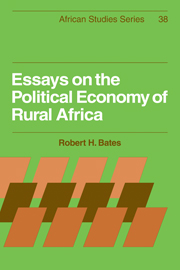Book contents
- Frontmatter
- Contents
- Dedication
- Acknowledgements
- Introduction
- Part I The pre-colonial period
- 1 The preservation of order in stateless societies: a reinterpretation of Evans-Pritchard's The Nuer
- 2 The centralization of African societies
- Part II The colonial period
- Part III Agrarian society in post-independence Africa
- Conclusion
- Notes
- Index
1 - The preservation of order in stateless societies: a reinterpretation of Evans-Pritchard's The Nuer
Published online by Cambridge University Press: 26 January 2010
- Frontmatter
- Contents
- Dedication
- Acknowledgements
- Introduction
- Part I The pre-colonial period
- 1 The preservation of order in stateless societies: a reinterpretation of Evans-Pritchard's The Nuer
- 2 The centralization of African societies
- Part II The colonial period
- Part III Agrarian society in post-independence Africa
- Conclusion
- Notes
- Index
Summary
These affairs are like a game in which everybody knows the rules and states of development: when one is expected to give way, when to be firm, when to yield at the last moment, and so forth.
The study of stateless societies represents one of the fundamental contributions of anthropology to political analysis. Nowhere have these studies been more vigorously pursued than in Africa. And among them, Evans-Pritchard's The Nuer stands as a foundational work.
In examining Evans-Pritchard's analysis, we shall, as have so many others, focus on the question: What are the sources of order in societies without states? In exploring his answers to this question, we shall underscore and exploit the parallelism between Evans-Pritchard's analysis and what is known as the prisoners' dilemma.
The Nuer are a pastoralist people. While they do cultivate gardens, they principally engage in rearing and herding cattle. Cattle form the basis of the Nuer economy. As Evans-Pritchard puts it, the Nuer ‘not only depend on cattle for many of life's necessities but they have the herdsman's outlook on the world. Cattle are their dearest possession.’ Cattle are the main property among the Nuer, and the joint family – the father, his sons, and their wives – is the elementary property-holding unit. Each family seeks to care for, nurture, and increase its cattle holdings. Evans-Pritchard reports that they expend great effort in this endeavor and succeed remarkably well.
- Type
- Chapter
- Information
- Essays on the Political Economy of Rural Africa , pp. 7 - 20Publisher: Cambridge University PressPrint publication year: 1983
- 5
- Cited by

